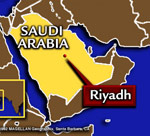 CNN: Iran is sharply criticizing a draft U.N. General Assembly resolution because it refers to an alleged Iranian plot against a Saudi ambassador, an assertion the Islamic republic calls “unsubstantiated.”
CNN: Iran is sharply criticizing a draft U.N. General Assembly resolution because it refers to an alleged Iranian plot against a Saudi ambassador, an assertion the Islamic republic calls “unsubstantiated.”
By the CNN Wire Staff
 United Nations (CNN) — Iran is sharply criticizing a draft U.N. General Assembly resolution because it refers to an alleged Iranian plot against a Saudi ambassador, an assertion the Islamic republic calls “unsubstantiated.”
United Nations (CNN) — Iran is sharply criticizing a draft U.N. General Assembly resolution because it refers to an alleged Iranian plot against a Saudi ambassador, an assertion the Islamic republic calls “unsubstantiated.”
In addition, a high-ranking Iranian official visiting the United Nations on Wednesday criticized the United States and other Western countries for unfairly targeting his country for its nuclear program.
The Saudi resolution, which condemns terrorism and attacks on diplomats, “deplores that plot” and makes note of a letter from the United States reporting what it characterizes as an “Iranian plot.”
The resolution also calls on Iran “to comply with all of its obligations under international law” and to cooperate in “seeking to bring to justice” the people who planned to kill the envoy.
It was expected to be introduced in a meeting Wednesday afternoon and may come to a vote by the entire General Assembly on Friday, a Saudi U.N. mission spokesman said.
Mohammad Khazaee, Iranian ambassador to the United Nations, said it would be a “gross disservice” to put “hypothetical, circumstantial and unsubstantiated matters” on the General Assembly’s agenda. The United States says Iran’s Islamic Revolutionary Guards Corps-Quds Force is behind the plot, but Iran denies the accusation. Such a resolution “would significantly undermine the role, authority, integrity, and credibility of the General Assembly as the highest and universal political body of the United Nations,” Khazaee said.
The draft makes references to the U.N. global counterterrorism strategy. But Iran contends the United States exploits the document and undermines it. It said the United States has backed terror acts against Iranians, including diplomats.
“The United States’ attitude with regard to the alleged plot, which began with an explosive media campaign against Iran, and its long-standing hostile policies, is unconstructive and reveals once again the latter’s ill intentions,” Khazaee said.
Manssor Arbabsiar, a 56-year-old naturalized U.S. citizen, and Gholam Shakuri, an Iran-based member of Iran’s Islamic Revolutionary Guard Corps, have been accused of conspiring to hire hit men from a Mexican drug cartel to bomb a restaurant where the ambassador would have been.
Authorities developed the case against the suspects with the help of an undercover informant posing as an associate of a Mexican drug cartel, according to officials and an FBI agent’s affidavit.
Meanwhile, Mohammad Javad Larijani, the secretary general for Iran’s High Council for Human Rights, told reporters that the recent International Atomic Energy Agency report about Iran’s nuclear program was “a disgrace for the agency.”
“It doesn’t include any evidence,” he said. “It is based on a laptop which was given to them by the United States four years ago.”
The report, which was released last week, stated that Iran was acquiring the technology for a nuclear weapons program.
Larijani reiterated his country’s position that its program is exclusively of a civilian nature.
Asked about the nuclear weapons trigger the report says Iran has been working on, he called it a “laughable allegation,” saying the device is used in several “technological devices.” He added that the “United States and a number of European countries, they do not want this issue to be settled. They want to keep that as a vehicle of pressure on Iran.”
Larijani continued chastising the United States by saying that “American policy in the region is falling apart. It is witnessing drastic failures, especially in Afghanistan.” He said that “when President Obama came to power and promised change, I was hopeful we could formalize change, but I think this hope was wrong totally.”
He was also asked about the uprising going on in neighboring Syria, an Iranian ally. He said that “any incitement to violence by the United States and Western countries and regional countries to export and send armed groups inside Syria” or to recommend that people use a gun in the uprising is very dangerous.
“All the hands should be cut off from this kind of interference,” he said.
CNN’s Joe Vaccarello contributed to this report


